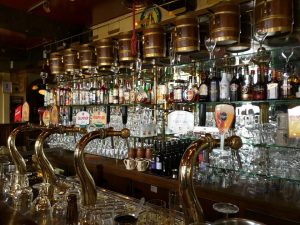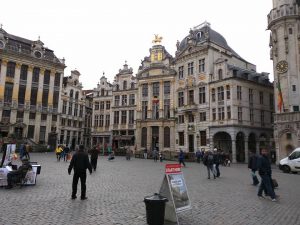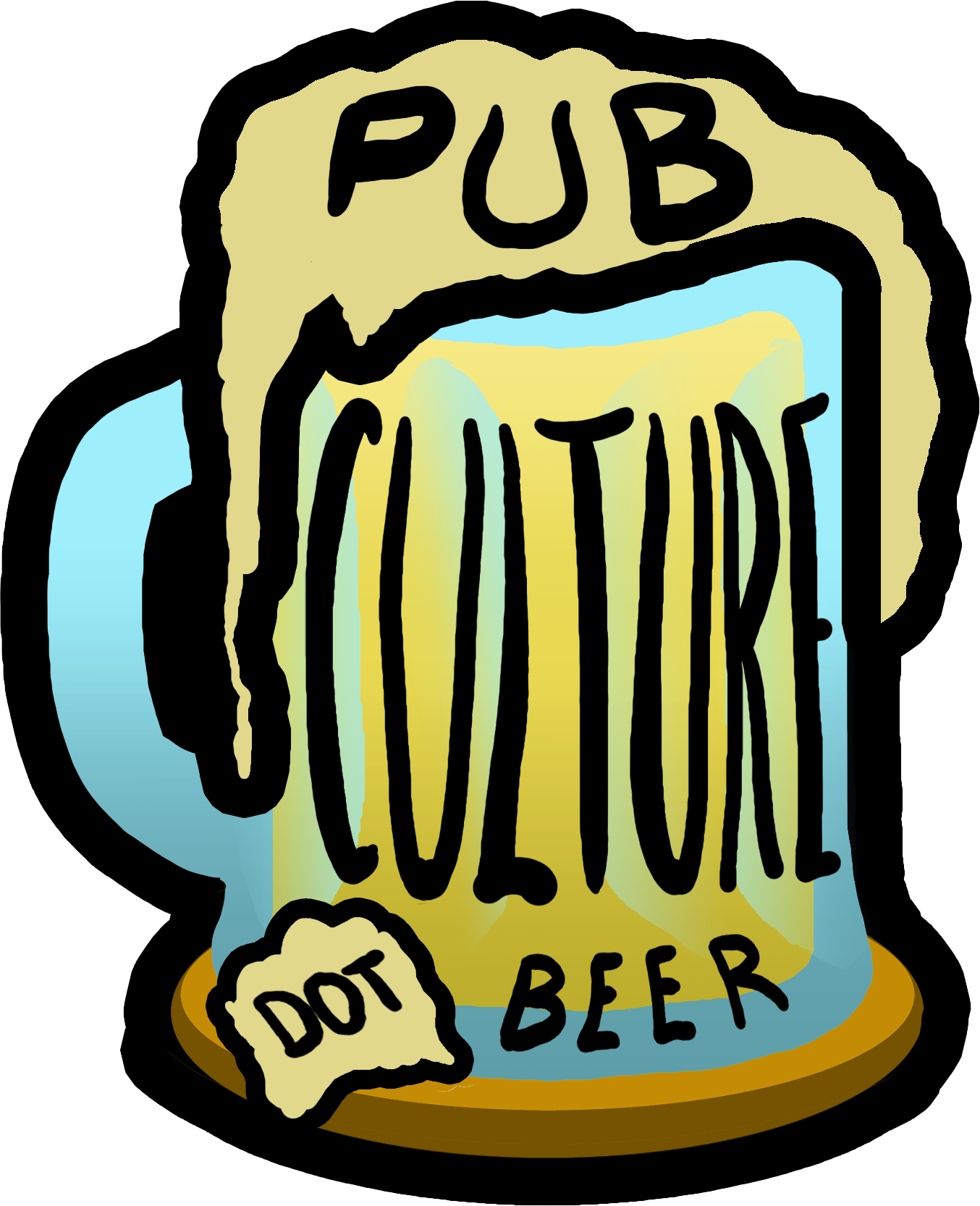Travelling to Europe
The first time I travelled to Europe, I didn’t know what to expect. I was going with my (then) wife, sister-in-law and mother-in-law. My (former) mother-in-law is a planner. In fact, she over-prepares. Her tips to us included things like:
- Make a copy of your passport and all your credit cards and IDs in case you lose your wallet
- Get a money belt so if you get pick pocketed you still have money
- Take old underwear that you plan on throwing out and do so on your trip so you have room in your luggage for stuff you want to bring home with you
I happen to think the first two tips are a bit paranoid. However, they are practical. I never did bother with the money belt, though. She also had a list of things to do once you get off the plane such as visiting a currency exchange and other, outdated things that aren’t necessarily your best bet any longer.

Planning
First thing to figure out is Where Do I Want To Go? Are you enamored with the idea of English or Irish Pubs? Do you love Belgian Beers? Hitting Oktoberfest? Looking for something a path less travelled? This is what you need to do first. Sketch it out. Pick the cities you want to visit. Realize that being closed on Sunday and/or Monday are common for places in Europe. You may even find places that are closed on odd days such as Wednesday. Are you travelling around some sort of festival? Plan early! Reservations are important. Location is very important in Europe, as you will be walking or taking public transportation 90% of the time. Now, figure out what city you are flying into and out of and reserve your airfare. This is a tricky game, finding the cheapest fare and I am no expert, so caveat emptor.
Items to take with you:
- Comfortable walking shoes – This is very important. You will be doing a lot of walking. Your feet will hurt for the entire first week. Personally, I average about 3 hours of walking a day when I am in Europe. I average about 35 minutes when I am at home. Your mileage may vary, pun intended.
- Umbrella and Rain Gear
- Options of weather appropriate clothing
- More underwear and socks than you think you will need. Remember that you can always throw away the old pairs you have as you go, which will give you more room in your luggage for trinkets and the odd bottle of beer to take back with you.
- Printed Maps of each city with addresses for each location you’d like to visit
- Unlocked Cell Phone – If you have one, most Americans do not. If you don’t know, assume you do not have one. (optional)
- External cell phone battery (optional)
- Portable Wifi Hotspot (optional) – take to a cell carrier in the country you are visiting and get a cheap SIM Card. It can really help if you get lost to have GPS from your phone. Realize that you will likely have to do this for each country you are visiting, so you might have to figure out if it is worth it first.
- If you are a big guy, like myself, take an extra set of clothes and put them in your carryon bag. This is in case your luggage gets lost as it’s hard to replace these things for large people in Europe.
- Backpack – Generally this is my carry on bag. But when travelling around you want to take your printed maps, your umbrella, any bottles or souvenirs that you pick up during the day, etc.
- A Water Bottle – One of those nice metal reusable ones.
- Bottle Packing Materials – You’ll likely want to bring a few bottles of beer back with you. Generally clothes will work as padding, but you may want to bring large ziploc bags and tape, etc.
- Passport Wallet – This serves two purposes. One, a great place to store your passport. Secondly, it will hold all your debit and credit cards, your hotel room key, etc. It will also be larger, and therefore will fit better in your front pocket, so you don’t have to worry about pickpockets as much.
- Talk to your bank (or visit their website) to learn about foreign transaction fees. Generally you can just visit an ATM and pay a small fee every time you need cash. It’s often much less than the currency exchanges you will find at most airports.
Another good tip for traveling when you know you’ll be visiting a lot of pubs and breweries is to give yourself a lot of slack time. Especially every few days, you should have hours of time with nothing planned. If you’re feeling good you can revisit a place you enjoyed or explore other parts of the city. If not, you can choose to take a nap. Basically if you are sitting there and thinking “I am not going to enjoy myself right now.”, then take the nap. You’ll be more refreshed for later and even for the next day. Sleep and rest is important during these trips as you will be more active than you normally are, and it can be hard to judge, because you are not used to it. Try to be aware and mindful of your rest needs. Always have some water before and after bed. Hydration is important with this much physical activity combined with drinking.
If your bank and/or credit card companies offer cards with the chips in them, make sure you order one ahead of time so it can arrive in time and be authorized for use before you go. Here’s an article by Rick Steves on the subject: https://www.ricksteves.com/travel-tips/money/chip-pin-cards A few days before departure, call your card companies and tell them where you are going and when, otherwise they may think that transactions are fraudulent, locking you out from your money. It’s also important to take a few cards with you, so you have options in case this happens accidentally to one of them or an ATM eats your card.
Plan which countries you are going to go to and what languages they speak there. While in many of the major cities, most people speak English, people really appreciate the effort and it can combat the ‘rude American’ stereotype. You’re going to need these phrases at the minimum:
- Hello
- Please
- Thank You
- Excuse me
- The local word for beer
- Numbers
- “Where is the toilet?” It’s likely more polite to ask about the WC or Water Closet, so read up and figure that out.
- The local equivalent for “Cheers!” Realize that this is largely regional and may be multiple things in the same language, depending on where you are.
- “Can we get the bill?” – In Europe it’s considered rude for the waitstaff to rush you by bringing you the bill. You will often have to ask for it. This can be hard for Americans at first as it seems rude to us. Also, Europeans generally stay away from the term Check… one time a gentleman asked me if I was Czech because it said “Check Card” on my debit card.

Travel Day
This is going to be a long day, so plan your travel accordingly. I suggest starting your travel early in the morning. Have your departure around 8am or so. This means you’ll likely be up at 6am or so. Using Amsterdam as an example, at 6am Central Time, it’s 1pm in Amsterdam. Your flight is at 3pm Amsterdam time. Assuming 15 hours of total travel time (unless you’re lucky and get a direct flight), you’ll be arriving at 6am local time. However, at that point it’s only 11pm back home. Travel is tiring, but don’t go to sleep yet. Jet lag sucks. It’s better to get wired and sleep deprived. Once you are done mucking around at the airport getting your luggage and getting through customs and get public transportation to your hotel, it will likely be closer to 10 or 11am local. Most hotels in Europe have a room to store luggage that you can utilize before check-in time. When in doubt, ask ahead of time to ensure this is the case.
At this point, you should hit up an ATM and get some cash, if you hadn’t already at the airport. Only get enough for a day or so, as if you do get pickpocketed, you’ll not lose everything.
You have now been awake for right around 22 hours. You’re going to be tired. Fight it. You’re in Europe and it’s morning. It’s time for a large cappuccino. This may be the best one you’ve ever had in your life. I think there’s a class on it in European public schools. I’m kidding, but it seems that everyone knows how to make an amazing cup of coffee over there. Start visiting places you want to see. Eat. Do stuff until at least 10pm, midnight if you can hack it. You’ll sleep well and won’t have jet lag jacking up your trip.
It’s A Marathon, Not A Sprint
Good morning. It’s your first morning in Europe. Breakfast is different here. If eating in your hotel, you’ll see what I mean. If not, find a local bakery and get a croissant. It will be amazing. Now, personally, I am not an early riser. This works out as depending on where in Europe you are, most breweries and pubs do not open until at least 11am at the earliest, often noon. So you can spend your morning mostly in bed, or if you do get up early, you can spend some time exploring the city you are staying in.
Regardless to how you spend your morning, whatever pub you decide to visit first, you’re going to have a lot of options. Now, as beer hunters, sometimes it’s not so easy to recognize what’s common or uncommon in a foreign land, and nobody wants to waste time drinking the equivalent to Bud Light or Heineken. However, throw those thoughts away and realize that you’ll learn as you go to different places what is common and what is not. You’re here to visit pubs and try new beers, right? Well try anything you haven’t heard of before. If you keep seeing it everywhere, well you don’t have to have it again. Remember, European beers are local there. They are going to be inexpensive, so bottoms up.
All that being said, remember that if it’s noon, you likely have 12 hours of drinking ahead of you. While it’s close to being a kid in candy store, pace yourself. Make sure you eat enough. Order water occasionally. Yes, you will likely have to pay for it, and you should specify that you want still water, unless you prefer it fizzy. Remember, you’re here for days and days. Hydration and rest will be needed. If you run out of water, pick up a 1.5 liter bottle of water at a local bodega and throw it in your backpack. These convienience stores will be called different things depending on where you are.
Remember, when visiting pubs, talk to the locals. It’s the most enlightening part of the journey and often they will share other great places to visit with you, often places that aren’t featured in travel guides. Personally I feel these are the best experiences, as I am not a fan of touristy things, for the most part. If beer hunting, talk to your barkeepers, if possible. Ask them where they like to drink, or about newly opened local breweries. Often I’ll be surprised to find out a new brewery has opened just down the street within the past six months. This is treasure. Enjoy your time. I will say it again though, hydration is important!

Returning Home
Due to the time difference, coming home is a much harder time adjustment than going to Europe. Additionally, if you have any problems catching connecting flights, etc. your day can become nightmarishly long. Plan at least one buffer day before going back to work. Best case scenario, you have an entire day to be lazy before you have to go back to work. Worst case scenario, you burn it up on a long layover somewhere. Either way, you should use the time to rest and adjust to the time difference.
